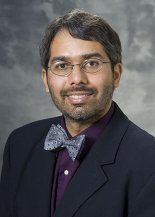Selected Podcast
Encore Episode: Digital Media and Virtual Schooling
Helping us navigate through all of these options today is Dr. Dipesh Navsaria, he is a pediatrician and spokesperson for AAP, as well as an associate professor of pediatrics at the University of Wisconsin School of Medicine and Public Health.
In this encore episode from October 2020, he tells Melanie how to best help your child with this challenging start to the school year, how to keep your kids from doing school in bed, and a reminder that teachers are learning to deal with all of this as well.

Dr. Dipesh Navsaria
Dipesh Navsaria, MPH, MSLIS, MD is a pediatrician working in the public interest. He blends the roles of physician, occasional children's librarian, educator, public health professional, and child health advocate. With graduate degrees in public health, children’s librarianship, physician assistant studies, and medicine, he brings a unique combination of interests and experience together.
An associate professor of pediatrics at the University of Wisconsin School of Medicine and Public Health, he has practiced primary care pediatrics in a variety of settings with special interest in underserved populations. With a graduate degree in children’s librarianship, he has the right skill set to be the founding medical director of Reach Out and Read Wisconsin and the founder and director of the Pediatric Early Literacy Projects at the University of Wisconsin. With respect to education, Dr. Navsaria is heavily involved in advocacy training for and is frequently involved in medical student and physician assistant education from the clinical arena through myriad small group and lecture formats. He serves as the medical director of the University of Wisconsin–Madison’s physician assistant program and is also the director of the MD–MPH program.
Dr. Navsaria works with the American Academy of Pediatrics on a state level, serving as the current vice-president of the Wisconsin Chapter. He also has served nationally on a number of committees, including being the founding co-chair of the Early Literacy Subcommittee of the Council on Early Childhood. He regularly writes op-eds on health-related topics, does radio and television interviews, and frequently speaks locally, regionally and nationally on early brain and child development, early literacy, and advocacy to a broad variety of audiences. He also has a modest professional presence on social media.
Born in London, England, and raised in New York City, Dr. Navsaria attended the Bronx High School of Science. His undergraduate education was at Boston University, majoring in Biology and English Literature. He completed a Master’s in Public Health at Boston University and Physician Assistant training at The George Washington University in the District of Columbia. He practiced as a pediatric physician assistant in East Central Illinois before attending medical school at the University of Illinois in Urbana. During his time there, he also completed a master’s degree in library and information science at the University of Illinois, focusing on children’s librarianship. He then completed his residency in pediatrics at the University of Wisconsin Hospitals and Clinics.
Dr Navsaria also does some work in the common-sense, intelligent application of technology to practical projects and situations. As a devoted user of Apple hardware for over twenty years, Dr. Navsaria also cares deeply about visual presentation and typography — information should be clear and beautiful in how it is passed on.
He lives in Madison, Wisconsin with his family. He has a lovely, supportive wife and two children. They not only put up with his sense of humor, they encourage it! Well, at least his wife does — his teenage children now just roll their eyes.
Committed to understanding how basic science can translate into busy primary-care settings via population health concepts and policy initiatives, Dr. Navsaria aims to educate the next generation of those who work with children and families in realizing how their professional roles include being involved in larger concepts of social policy and how they may affect the cognitive and socioemotional development of children for their future benefit.